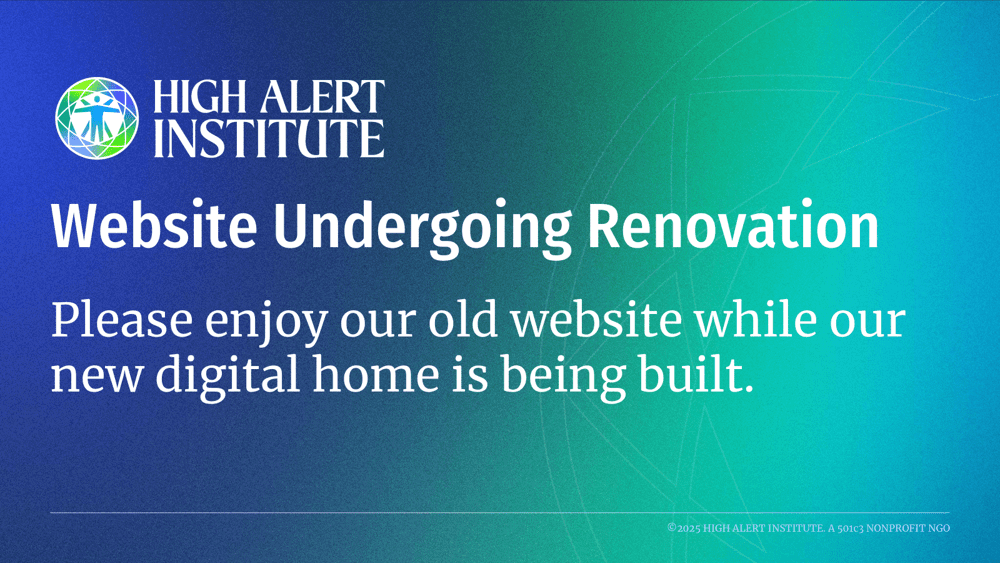High Alert Institute
Profiting from Disaster: How to Ethically Make Money During Times of Crisis

When a disaster strikes—whether it be a hurricane, earthquake, flood, terrorist attack, or some other devastating event—many businesses are eager to volunteer and assist those in need. They want to help rebuild the damaged homes and businesses, and they often donate the necessary materials and manpower to do so. Unfortunately, the resources that are brought in on a volunteer and donation basis typically run out much sooner than expected. And very often, those businesses who gladly gave their time and resources to those in need feel guilty charging for additional services, so they pack up and leave the area, proud of their good deed, yet leaving those in the disaster area with few recovery options.
A great example of this is what happened in Port Charlotte, Florida after hurricane Charley. Initially after the hurricane, a large number of contractors went to the area, donating services, supplies, and other things needed to rebuild the community. The federal government also came in and paid many of the rebuild bills, even things not normally covered by FEMA. But then the money started to run out, and the majority of the volunteers went home. The funny thing is that the residents of Port Charlotte didn’t want the contractors to leave and would have paid the contractors their normal rate to stay and finish the disaster recovery efforts. But the contractors—those who were there on a volunteer basis—felt guilty taking money from disaster victims. Now, two years later, many Port Charlotte residents are still seeking reputable contractors to help them. It’s an unfortunate situation that doesn’t have to happen.
Perhaps even more concerning is that we’re starting to see a similar trend in the people and companies that help with disaster preparedness. Recently the Annals of Emergency Medicine, one of the largest emergency medicine journals, published an editorial aimed specifically at universities that were profiting from selling courses developed under grant dollars. That is, they created disaster preparedness materials using federal grant money, and then they made hospitals and communities pay to receive the course materials. While such a practice is clearly unethical, many people thought the journal was implying that it’s unethical to make a business of disaster preparedness—to go into communities and hospitals and charge a consulting fee or teach for profit how to be ready in the event of a disaster. In reality, nothing could be further from the truth.
So does that mean it’s possible to profit from a disaster situation and not feel guilty? Yes! And those businesses that are able to come into a community after a disaster strikes and offer a needed product or service can profit handsomely…and ethically.
3 Ways to Profits
When it comes to profiting from disaster, most people think of price gouging or profiteering. Price gouging is not only immoral and unethical, but in every state and every territory, it’s also illegal. It’s a criminal act in which you’re taking advantage of people who have no choice but to pay. When hurricane Katrina hit New Orleans, we heard examples of unscrupulous store owners selling generators (that normally retailed for a few hundred dollars) for two and three thousand dollars. All those people received jail time or fines, and their business license was revoked. Such people are not seeking to profit from disaster; they’re seeking to profit from misery.
There are essentially three ethical ways to make money after a disaster.
1. Volunteer and Donation. In this scenario you volunteer your time and donate your products or services. You cover all your own costs and accept nothing in return, other than perhaps food and lodging. In return for your time and materials, you get the warm fuzzy feeling of doing something good for the community. You become an everyday hero. If you’re visible during this time, you also get great publicity, which could lead to business down the road from those who remember your good deed.
2. Discounted Services. This is the most common scenario, and just as the name implies, it means that you offer your products and/or services to the community at a discounted rate. Those who opt to go this route figure out how low they can price something without the decision being a burden on the business. Realize, though, that no one in the community asked for the discount (although none will turn the discount down either). Often, the business owner gives the discount because he or she has some level of altruism.
3. Full Price. In this scenario, you come into the community and bid a fair market price for a product or service, roughly equivalent to what other companies would charge during non-disaster times. And because it’s fair market price, people are more than happy to pay it. This is completely moral and ethical. Unfortunately, few businesses make the transition to full fare after starting out as a volunteer. But if you really want to grow your business and profit from disaster, this is the way to go.
From Free to Fee
So how does a business make the transition from a volunteer to a paid consultant or contractor? Here are some suggestions:
Be upfront. State how long you can offer your products or services for free. For example, tell people, “I can afford to volunteer for two weeks. I can afford to bring X amount of materials. If we run out of materials before two weeks, you supply the material and I’ll stay the remainder of the time I stated.” After the two weeks are up, before you pull out and leave, talk with the people you’ve been helping. Explain again that you can only afford to volunteer for two weeks. Very often, at that point, they’ll ask you to bid the remainder of the work. Then you can offer a fair market bid. If you get a “yes,” then why would you not stay? You’re already there, and now you’re making money. If they say “no,” then they’re taking responsibility for their own recovery. At that point, you can go home and tend to your business, knowing that you’ve done a good deed.
When your community does its disaster relief plans (before a disaster hits), put your company on the list of businesses available to aid in the recovery efforts. Businesses can work with their local communities to be “first-called” in the event that a disaster strikes. What does that mean? Assuming that the business is capable of responding, that business will put the community recovery (or specific targeted recovery within the community) at the front of the line. But that’s just the beginning. In some cases, a business (let’s say a hospital, for example) may contract with a service provider (such as a roofing contractor) and pay a retainer fee so that in the event of a disaster, that contractor will put the hospital at the front of the list. In return, that contractor gets the bid for the other work the hospital needs done. The contractor is happy to give that deal because it guarantees them business. This is completely ethical. In fact, it’s a win-win solution. The business gets the repairs they need done and contractor has guaranteed work. What could be better?
The bottom line is that businesses need to understand the different ways they can help, and they need to get over the stigma of profiting from disaster. Realize that the people receiving your products or services don’t mind paying for them. In fact, nobody on the receiving end of the products or services expects to get everything for free, and most of them will gladly pay a fair market price for anything you offer. So take full advantage of this profitable market segment. By doing so, you’ll be helping people in need while helping your own business grow.
High Alert Institute
4800 Ben Hill Trail
Lake Wales, FL 33898
Office: 863.696.8090
FAX: 407.434.0804
EIN: 27-5078437
Info@HighAlertInstitute.org
Privacy Policy
Cookie Policy
Terms of Use
Disclaimers
Get Your Data
Shipping Policy
Message Us
Transparency
Registrations
Do Not Sell Info
Return Policy
A COPY OF THE OFFICIAL REGISTRATION AND FINANCIAL INFORMATION MAY BE OBTAINED FROM THE DIVISION OF CONSUMER SERVICES BY CALLING TOLL-FREE, WITHIN THE STATE, 1-800-435-7352 (800-HELP-FLA), OR VISITING www.FloridaConsumerHelp.com. REGISTRATION DOES NOT IMPLY ENDORSEMENT, APPROVAL, OR RECOMMENDATION BY THE STATE. Florida Registration #CH68959
REGISTRATION WITH A STATE AGENCY DOES NOT CONSTITUTE OR IMPLY ENDORSEMENT, APPROVAL OR RECOMMENDATION BY THAT STATE.










